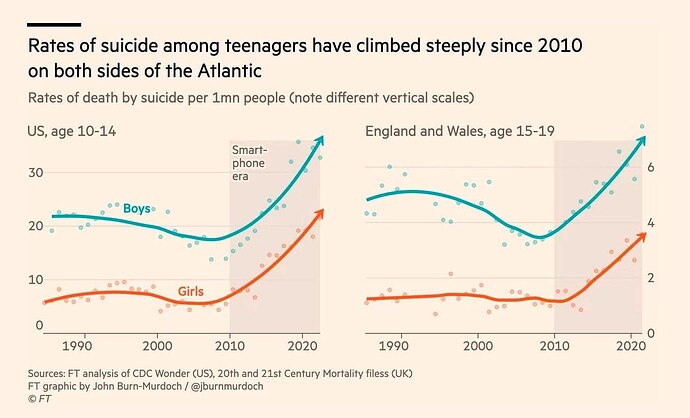Well, it won’t take us to any happy place, but according to recent research it takes teenagers to suicide:
On average kids spend almost 7-8 hours on screens daily, half of it on social media. Their overloaded brains are basically boiling in dopamine. I’d recommend any parent to also read this outline of scientific research on social media effect on children development (and follow some good advice on how to handle this madness).
I’ve recently struggled with my mental health issues, and I started reading more on this*, and decided to radically detox myself from screens. I started commuting to work without a phone, this changed to going phone-free 99% of the time - I now only use my phone only when I absolutely have no other option. I still use my computer at work, and from time to time (like tonight) at home, but most of the time after work I’m leaving my computer in the closet in another room and I ask my wife to police me to not pick it out. This really helped me relax my brain and get back into book reading - on the other hand, I have much more time to think about what I should do with my life and this sparks some anxiety too. In any case, I’d recommend everybody for a test going phone-free (yet better, screens- and Internet-free) for a month - it’s a fascinating experience to go through withdrawal symptoms, like some kind of alcoholic or drug addict.
Screens are literally driving our brains bananas and our children to kill themselves. We should be as serious about them as we are about hard drugs. Most people seem to be not aware of what is going on - many of my friends in Poland bought their children smartphones when they were 6-7 years old. It’s lunatic.
*) Recommend books: “Dopamine Nation” by Anna Lembke, “The Coddling of the American Mind” by Greg Lukianoff and Jonathan Haidt, “The Anxious Generation” by Jonathan Haidt, “iGen” by Jean Twenge, “Digital Minimalism” by Cal Newport, “The Shallows” by Nicholas G. Carr, and classic “Amusing Ourselves to Death” by Neil Postman
PS. All of this reminds me of the introduction to “Brave New World” written by Huxley in 1946 (!), where he wrote about an alternative to the dystopian future:
Science and technology would be used as though, like the Sabbath, they had been made for man, not (as at present and still more so in the Brave New World) as though man were to be adapted and enslaved to them.
